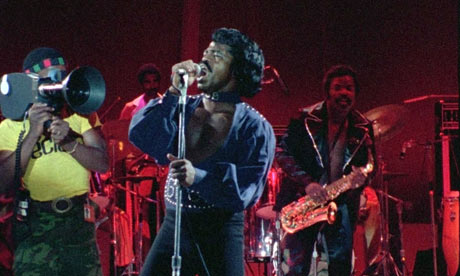
Stewart Levine, festival promoter
I had been making records with Hugh Masekela since the early 1960s. We'd got this African-American hybrid going, and were always looking for ways to get more western exposure to African music: it really was the dark ages in awareness terms. When I saw George Foreman was fighting Muhammad Ali for the world heavyweight boxing title in Zaire in 1974, my mind went boom: let's do a music festival and a film.
Hugh and I weren't just into soul, and we cast our net wide. We had the Fania All-Stars with Celia Cruz, and Miriam Makeba, as well as BB King, James Brown, Bill Withers and the Spinners. The Spinners' manager was this funny little cat out of Philadelphia, a real sweetheart, and he said to me: "I've three girls who are gonna be great. You don't have to pay them anything, they haven't made any records yet. I said: "Sure, just bring them along." They were Sister Sledge.
We had some people turn us down – even personal friends like Stevie Wonder and Sly Stone – because we were all flying out together on our own plane with no extra equipment. They wanted to bring entourages and have their own planes. But it meant we ended up with the people who really wanted to be there.
Everyone was easy to negotiate with, except James Brown. At the last minute, he got three extra dates in Africa, meaning he needed his sound system and back-ups. So he turned up at the airport with 32,000lb of extra equipment which almost stopped us going, because we were overweight. I just closed my eyes and let them load it on, to the chagrin of many, including Bill Withers, who had worked on planes and wanted to kill James. He had a massive ego, but we kept him away from everybody, and people respected him anyway; once he got on stage you forgot you didn't like him.
The concert took place in a refurbished soccer stadium in Kinshasa. The dressing rooms had once been used as a prison. We constructed a special stage, the largest outside Woodstock, and we had the best sound system you could get in the early 1970s: a 16-track studio we'd packed into a truck. My idea for filming was simple. I hired the best documentary makers, and told them "just get coverage"; I knew they had the ability to pull it off. That was why the film is so layered, because everyone had their own take on it. Brown and Cruz, who was so full of fire, got the biggest responses, but Withers was amazing. The song he performs in the film, Hope She'll Be Happier – which he'd pulled out of nowhere at 3am, reflecting trouble he was going through with a girl – he has never sung since.
Reading this on mobile? Click here to view video
Jeffrey Levy-Hinte, film producer
The footage of the Zaire concert seemed to me so powerful that when I edited it into a documentary in 2008, I felt it should speak for itself. [Levy-Hinte had previously edited When We Were Kings (1996), a documentary about the Foreman-Ali fight, using footage shot by many of the same film-makers.] So the cinema verite quality the film has arose naturally out if that. Stewart had brought in these excellent film-makers, and many of the camera rolls struck me as near–perfect short films.
In one scene, film-maker Paul Goldsmith happens upon a group of Kinshasa street musicians. He begins walking slowly down the road towards them until they gradually fill the frame, and the sound of their playing drifts over. Then he moves around them in a purely intuitive way, closing in on the singer before he sings, and then the drummer before he begins a flourish, and then he backs out again. It is quite mesmerising.
Over the end credits we used footage by Albert Maysles, who tracked Brown back to his dressing room; there is not a wasted frame. Brown was so obviously "on", like a machine. He would have played to the camera all evening, but I think his people realised he was going to collapse, having just done a two-hour set, jumping around and doing the splits.
I also wanted to convey the prevalence of music in the everyday life of Zaire people, how it was in the rhythm of their movement, talk and gestures. BB King was incredibly profound, talking about how it felt like returning to his homeland and discovering, after all this time, that the musical affinity was still there.

